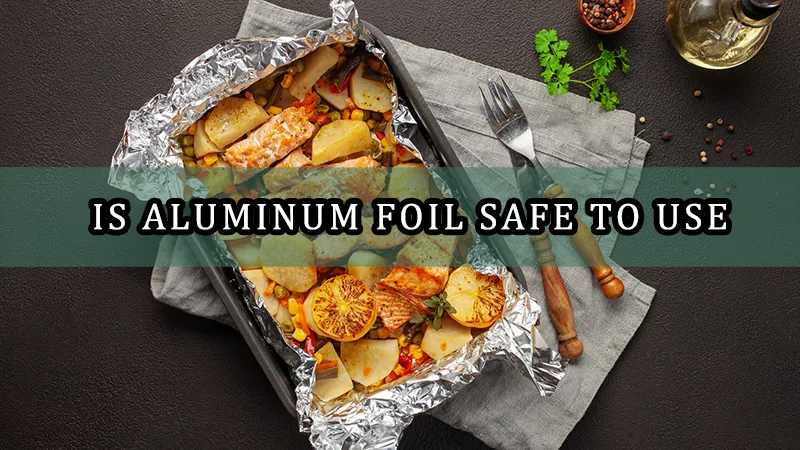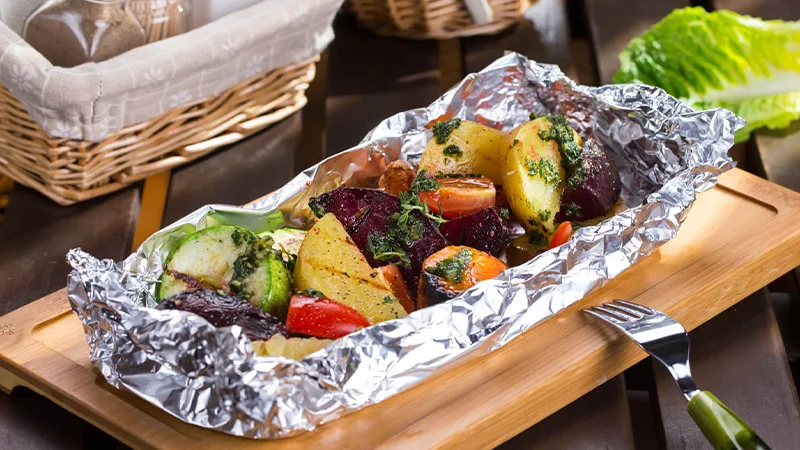Aluminum foil is commonly used for heating in the oven and cooking. Some people believe that using aluminum foil can cause the aluminum to leach into your food and endanger your health; others believe that it is completely safe to use. This article focuses on the risks associated with using aluminum foil and whether you can continue to use it.

What Is Aluminium Foil Paper
Aluminum foil, also known as tin foil in the past, is a paper-like, metallic aluminum sheet. Aluminum foil is less than 0.2 mm thick and is used for packaging, insulation, and electronic appliances in addition to home use.
In the home, we use foil to bake and preserve food. Or to scrub dishes and grills to remove stains.
Is It Safe To Use Foil
Aluminum is one of the most abundant metals on Earth.
In its natural state, aluminum is bound to elements such as potassium phosphate and potassium sulfate in soil, rocks, and clay. It is also present in air, water, and food, including fruits, vegetables, meat, fish, grains, and dairy products. Some foods, such as tea, mushrooms, spinach, and radishes, also absorb and accumulate aluminum more easily than others.
In addition, the aluminum you eat may also come from processed food additives, such as preservatives, colorants, anti-caking agents, and thickeners. These food additives contain more aluminum than the food itself.
Of course, aluminum can also enter your body through medications. However, only a small portion of the aluminum content in food and medications is absorbed by your body, and the rest is excreted in your stool.
So, it is safe to eat foods that will not affect your health every day.
Is Aluminium Foil Safe to Cook and Grill
Most of the aluminum you consume comes from food. However, studies have shown that aluminum foil, cookware, and foil containers leach aluminum into food. So, cooking with aluminum foil products may increase the amount of aluminum in your diet. These factors directly affect the leaching of aluminum:
- Temperature: Cooking at higher temperatures.
- Food: Cooking with acidic foods, such as tomatoes.
- Seasoning: Using too much salt and spices.

The amount that leach into food during cooking can vary. For example, cooking meat in foil can increase aluminum levels by 89%-378%.
So, regularly using aluminum foil in cooking can be harmful to your health. However, there is no evidence that using aluminum foil increases the risk of disease. We think it is safe to use aluminum foil for occasional cooking and grilling.
Aluminum And Alzheimer’s Disease
Alzheimer’s disease is a neurological disorder caused by the loss of brain cells. Many people believe that because high levels of aluminum are found in the brains of Alzheimer’s patients, consuming aluminum will cause Alzheimer’s.
This discussion is wrong. The cause of Alzheimer’s disease is unknown, but it is thought to be a combination of genetic and environmental factors. However, exposure to very high levels of dietary aluminum may contribute to the development of brain diseases such as Alzheimer’s. Therefore, it is important to avoid excessive intake of aluminum in your life. However, it is important to understand that daily intake of aluminum in your diet is very safe and harmless.
How To Reduce Aluminum Intake
It’s impossible to completely eliminate aluminum from your diet, but you can work to reduce it.
WHO and FDA: Levels below 2 mg per 2.2 lbs (1 kg) of body weight per week are unlikely to cause health problems.
European Food Safety Authority: 1 mg per 2.2 lbs (1 kg) of body weight per week is considered safe.
You can also reduce your aluminum intake by:
- Avoid high-heat cooking: Cook foods at lower temperatures whenever possible.
- Use less aluminum foil: Reduce the use of aluminum foil when cooking, especially when cooking with acidic foods, such as tomatoes or lemons.
- Use non-aluminum utensils: Use non-aluminum utensils to cook foods, such as glass or porcelain dishes and utensils.
- Avoid mixing aluminum foil with acidic foods: Avoid contacting aluminum foil or cookware with acidic foods, such as tomato sauce or rhubarb.
In addition, because commercially processed foods can be packaged in aluminum or contain food additives that contain aluminum, they may contain higher levels of aluminum than homemade foods. Therefore, eating more homemade foods and reducing the intake of commercially processed foods may help reduce aluminum intake.
Aluminum exposure can be reduced by reducing the intake of highly processed foods and reducing the use of aluminum foil and aluminum cookware.
Should Aluminum Foil Be Stopped
Aluminum foil is not dangerous, although it can increase the amount of aluminum in your diet by a small amount. If you are concerned about the amount of aluminum in your diet, you may want to stop cooking with aluminum foil. However, the effect of aluminum foil on your dietary aluminum intake is minimal. Since the amount of aluminum you are probably eating is well below the amount considered safe, you can continue to cook with foil.



